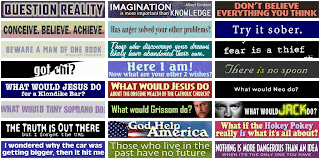
I believe that your parents help to shape a lot of who you are as a person. My parents have influenced me in a number of ways, one of which is in relation to bumper stickers. To my knowledge, my parents have never put a bumper sticker on any of their vehicles. Likewise, I am proud to say that I as well have never put any type of sticker on my motor vehicles.
I have this theory that bumper stickers are a good indicator of your sanity level - the more bumper stickers you have, the more likely you are to be insane. All of us have seen those cars (usually a beater or a Toyota Prius) where every single inch of the back is covered with bumper stickers - yeah, those people are usually crazy.
I wonder what possesses people to actually put a bumper sticker on their vehicles. I know people want to be heard and to communicate, but is a bumper sticker ever an effective means of doing this?
The most memorable bumper sticker I have seen was on this beat-up, rusted-out old dirty van. On the back was a bumper sticker that said: "Don't laugh, your daughter is in the back" That is just disturbing.
There are so many types of bumper stickers that annoy me. Below are a few:
- Really old campaign stickers - Gore/Lieberman lost the 2000 election seven years ago, it is time to take off the sticker
- Religiously fanatical stickers - "If case of rapture, car will be unmanned" "Real men love Jesus", etc.
- Blind Patriotism - "God Bless America" "Support our Troops" "First Iraq, then France" etc.
- Politically Angry - "Impeach Bush" "The Bush Legacy: Leave no child a dime" etc.
- Calvin peeing on anything
- 1-up bumper stickers - Jesus fish, Darwin fish eating Jesus fish, Truth fish swallowing Darwin fish, etc.
- Prideful parent stickers - "My kid is an honor student" "My kid beat up your honor student" etc
I think that I should add "bumper stickers" to my list. Here is where it stands now:
1. Wearing a cell phone on your hip
2. The idea that a nice smile is the "normal" way to pose for a photograph
3. People who cut to the front of a traffic back-up when they know they need to get over
4. Local TV Newspeople
5. Confirmational Reactionist
6. Wearing a blue tooth headset as a fashion accessory
7. Putting Bullethole stickers on your car
8. Placing a fake baseball on your car that gives the allusion that it has shattered your window
9. People who litter
10. Ignorcycles
11. Bumper stickers

.jpg)